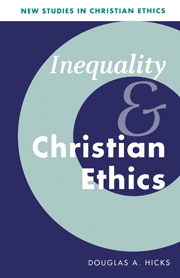Book contents
- Frontmatter
- Contents
- List of figures and tables
- Acknowledgment
- General editor' preface
- Preface
- List of abbreviations
- PART ONE CONTEXTUALIZING INEQUALITY
- PART TWO CONSTRUCTING A CHRISTIAN ETHICAL APPROACH
- PART THREE TRANSFORMING DISCOURSE, PERSONS, AND SOCIETIES
- 9 Expanding public discourse on inequality
- 10 An application: inequalities and human development
- 11 Conclusion: implications for inequality and Christian ethics
- Appendix A The Gini coefficient, inequality, and value-claims
- Appendix B Constructing Gini coefficients in income, education, and health/longevity
- Appendix C The construction of the HDI and the IAHDI
- Bibliography
- Index
11 - Conclusion: implications for inequality and Christian ethics
Published online by Cambridge University Press: 05 June 2012
- Frontmatter
- Contents
- List of figures and tables
- Acknowledgment
- General editor' preface
- Preface
- List of abbreviations
- PART ONE CONTEXTUALIZING INEQUALITY
- PART TWO CONSTRUCTING A CHRISTIAN ETHICAL APPROACH
- PART THREE TRANSFORMING DISCOURSE, PERSONS, AND SOCIETIES
- 9 Expanding public discourse on inequality
- 10 An application: inequalities and human development
- 11 Conclusion: implications for inequality and Christian ethics
- Appendix A The Gini coefficient, inequality, and value-claims
- Appendix B Constructing Gini coefficients in income, education, and health/longevity
- Appendix C The construction of the HDI and the IAHDI
- Bibliography
- Index
Summary
What does Christian ethics have to say about inequality? The previous chapters have taken up this question in a variety of ways, engaging with interlocutors theological, philosophical, and social-scientific. Discussions have ranged from empirical analysis of inequality at international and domestic levels, to a reading of equality and inequality in Christian theology, to a policy-oriented proposal for assessing genuine and equitable human development. The “and” in Inequality and Christian Ethics proves to be as complex as any of the other words in that title. Particular substantive insights into Christian social ethics and the evaluation of inequality should be valuable in their own right. Yet the most significant innovation or contribution of this book may be its constructive, multifaceted conversation among Christian ethics, political philosophy, and the development literature around the question of inequality.
This concluding chapter does not provide a comprehensive summary of the insights of the book, though some of the arguments and findings are noted. The central task-at-hand, rather, is to name some implications of this project. Like the inquiry itself, these implications relate to a number of dimensions of inequality and to different persons and groups. The approach calls for analysis that is empirical as well as normative and that integrates interdisciplinary perspectives. Action, too, is needed, on the part of Christians, people of other faiths, and those espousing no faith. This action extends to personal, communal, and societal levels.
- Type
- Chapter
- Information
- Inequality and Christian Ethics , pp. 231 - 246Publisher: Cambridge University PressPrint publication year: 2000
- 5
- Cited by

